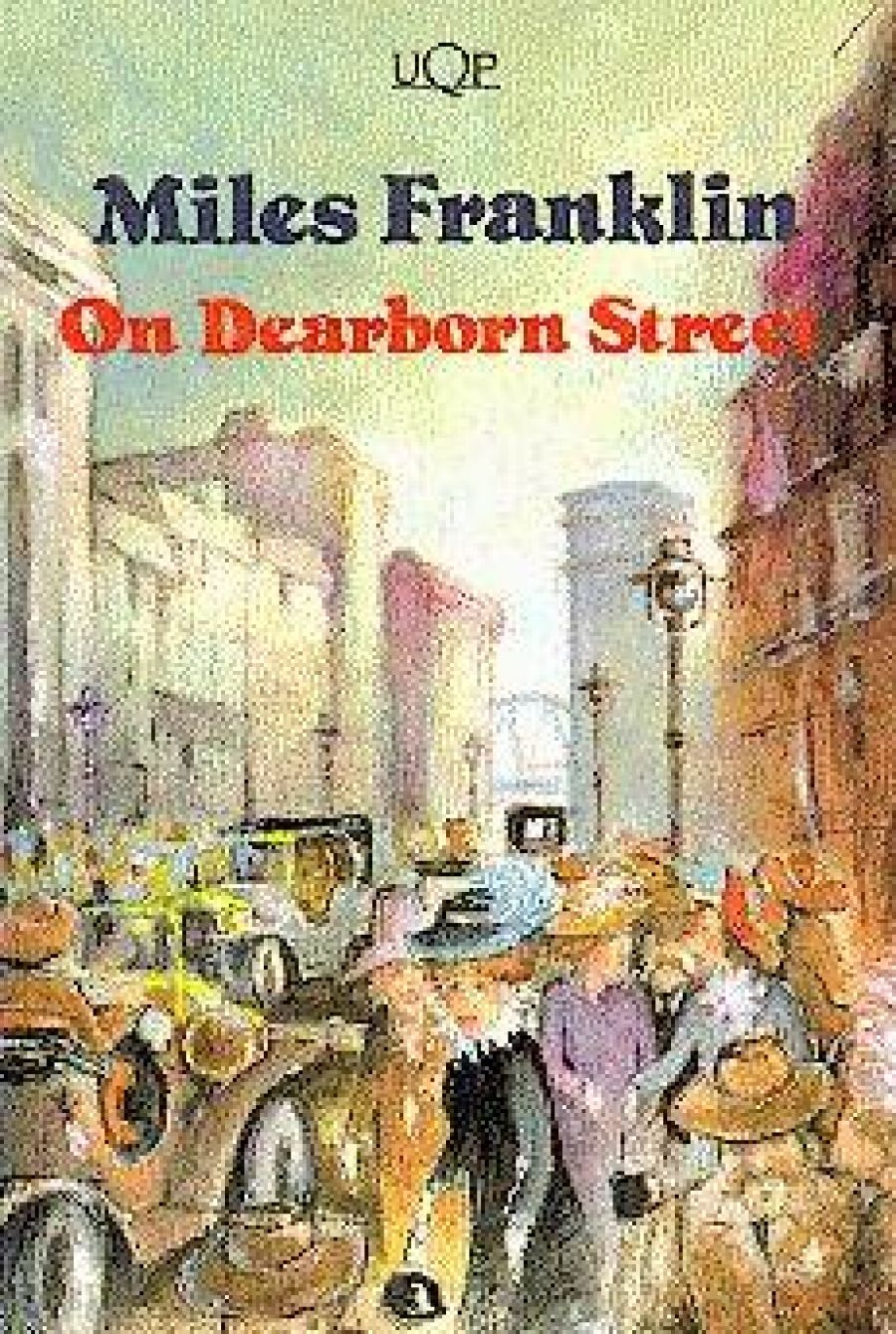
- Free Article: No
- Contents Category: Fiction
- Review Article: Yes
- Online Only: No
- Custom Highlight Text:
This novel raises more interesting questions about its author than about its characters and action.
- Book 1 Title: On Dearborn Street
- Book 1 Biblio: UQP, $14.95, 219 pp
The ups and downs of this courtship are not very interesting. Nor is the Chicago setting (we get little sense of the life which Miles Franklin encountered in this period as Secretary of the National Women’s Trade Union League). The most striking feature of the novel is Sybyl’s delay. She has many sensible feminist reasons for doubting whether she should ever get married, but her doubts seem to originate at a level deeper than reason – a level which the novelist apparently has no wish to explore. So the novel is characterised more by denial or suppression of large areas of life than by examination of them.
Although Sybyl shows an intelligent grasp of sexual relations in social and political terms, she treats the more intimate and physical aspects of these relations with a light evasiveness, and in this she is true to the spirit of the novel as a whole. She is lightly flirtatious, in a way best suited, not to arouse a man’s passions, but to keep such passions and her own deeper feelings at a distance. Mr Cavarley, who is nearly forty, claims at times that his blood is stirring with a ‘grand all-consuming passion’, but such claims about passion and sexual desire in this novel always seem limp gestures. More commonly he (like Sybyl) speaks with a harmless, humourless, goodhearted glee: ‘Whoop ye little hills! Skip ye little billy goats and lambs! Bend down and bow ye trees! Make a garden and a seat therein for me and my love!’ Repeated attempts to pump the narrative and dialogue full of effervescence result in a pervasive, depressing flatness. A kind of energy seems at times to lie behind these attempts, but it lacks direction, and eventually loses itself in sentimentality over Bobby’s death. The novel hardly shows a trace of that deep joy which Miles Franklin gave and received in working companionship with Margaret Robins and other Chicago women (to which Verna Coleman refers in Her Unknown (Brilliant) Career).
What lies behind such a sadly devitalised production? To answer that question, we could ask a parallel one: why should Sybyl feel attracted to a transparently selfish clot like Bobby? Perhaps Miles Franklin presented him as little more than a caricature because she was more strongly drawn to charming, rich, lively young men than it suited her to recognise: perhaps for her they had a vitality which was simultaneously appealing and threatening. The physical business of sex in this novel is likewise simultaneously appealing and threatening, and needs to be kept at a distance. So the author presents us with a devitalised Bobby Hoyne, a passionless Cavarley. And Sybyl Penelo herself, the Miles Franklin character in the novel, will not even agree to a tentative engagement with Cavarley until she gets a definite assurance that he has never had a naughty in his life.
The episode in which she hears this pleasing information is presented by Cavarley the narrator, and Miles Franklin the novelist, without a hint of irony. And this is not the only sign that beneath the novel’s thin, cheerful surface lurks a complementary spirit of repression. Most obviously, Miles Franklin endorses the repression of sexual needs and sexual acts, but this is only one form of repression, one element in a general pattern: negative instincts and processes – in particular, light-hearted evasion and concealment – are essential to the novel, and evidently provide a basic motive in its creation. (In this respect, On Dearborn Street may reflect the personality of the author, who took care to conceal many important facts in her life, such as her authorship of the Brent of Bin Bin books, and how she spent her decade in America.)
The process of devitalisation in this novel goes far beyond sexual prudery. In an untypically acute observation, Cavarley sees that Sybyl’s cynicism about love is ‘the refuge of the heartsick’. On Dearborn Street, under its surface, really is a heartsick novel: it seems the product of a tired, disillusioned mind. Miles Franklin obviously suffered great tiredness and disillusionment in the period in which the story is set, but very possibly the heartsickness had much older and deeper origins. The complaint of Sybylla Melvyn encourages belief in this possibility:
My sphere in life is not congenial to me. Oh, how I hate this living death which has swallowed all my teens, which is greedily devouring my youth, which will sap my prime ... [Emphases added]
The terms of this complaint suggest that the process of devitalisation began early in Miles Franklin’s life. Perhaps we must track her, back through many years of living death, to girlhood, in order to understand why On Dearborn Street should look like the work of a woman who has undergone the virtual cauterisation of essential parts of her humanity, and her creativity.


Comments powered by CComment